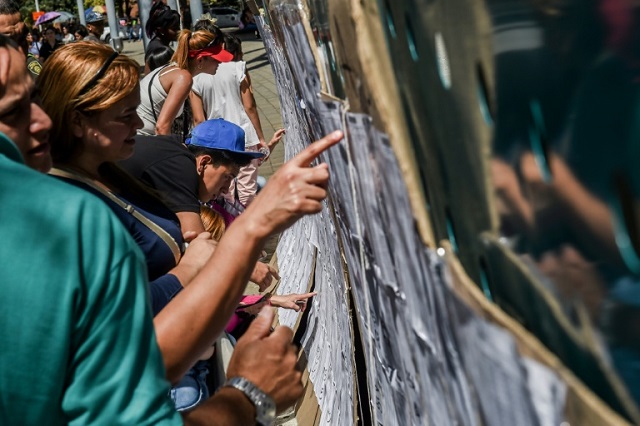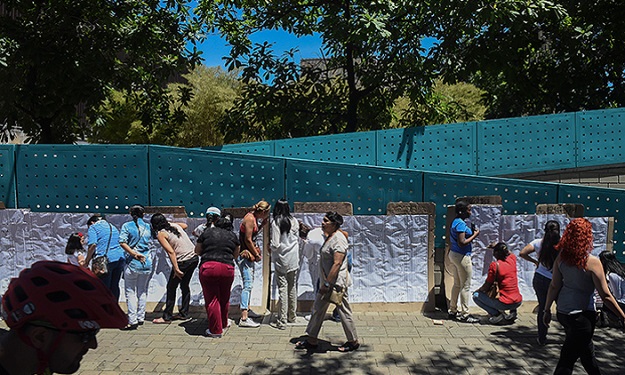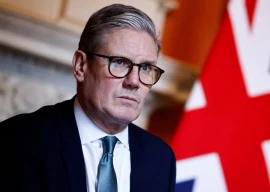
Two police officers killed in Colombia car bombing
The hardliners' victory raises questions about the future of the peace agreement signed with President Juan Manuel Santos in November 2016.
 People check the electoral roll at a polling station in Medellin, Antioquia Department, during parliamentary elections in Colombia on March 11, 2018. PHOTO: AFP
People check the electoral roll at a polling station in Medellin, Antioquia Department, during parliamentary elections in Colombia on March 11, 2018. PHOTO: AFPSantos said the polls were "the safest, most transparent elections" in the country's recent history, with the FARC spurning jungle warfare for politics, and the ELN -- the country's last active rebel group -- observing a ceasefire.
"This is the first time in more than half a century that the FARC, instead of sabotaging the election, are taking part in it," he said, adding that the ELN had "respected" their ceasefire.
The Centro Democratico party of ex-president and senator Alvaro Uribe, a fierce opponent of the peace agreement, polled the most votes, winning 19 seats in the Senate and 33 in the lower house. But centrist and leftist parties also polled strongly to deprive the right of a majority.
"There are no big changes, there are adjustments," Frederic Masse, an expert in armed conflict and the peace process at Externado University, told AFP.
The peace accord with the now-renamed Revolutionary Armed Forces of Colombia (FARC) guarantees their new political party 10 of the 280 seats in the new Congress, five in the Senate and five in the Chamber of Deputies.
"It's the first time in my life that I've voted and I do it for peace," said Pablo Catatumbo, a former FARC commander who was assured a senate seat.
A man casts his vote at a polling station in Cali, Valle del Cauca Department, during parliamentary elections in Colombia on March 11, 2018. VIDEO: AFP
The party uses the same Spanish acronym, which now stands for the Common Alternative Revolutionary Force, and replaced its crossed-rifles insignia with a red rose when it became a political party under the deal.
Opinion polls had given the FARC little chance of adding to its 10 free seats, following a disastrous campaign during which its rebels-turned-politicians were largely drowned out by a tide of public revulsion over crimes committed during the conflict.
In the end it polled 0.35 percent in the Senate vote, and only 0.22 percent of the vote for the lower house. Analysts said the party would now focus on building grassroots support for upcoming local elections.
Voters also chose the candidates from the right-wing and leftist coalitions who will contest the presidential election in May, in primaries held in parallel to the legislative vote.
Ivan Duque, of Uribe's party, won the right-wing primary with more than 2.7 million votes, or 67 percent of the poll, and will spearhead hardline opposition to the peace deal.
Gustavo Petro, a former Bogota mayor who is seeking to become conservative Colombia's first leftist president, will oppose him after winning nearly two million votes, 85 percent of the poll, in his primary.
Opinion polls had predicted a triumph for hardline conservatives like Uribe who want to scrap the agreement, pushing on to win the presidential election in a few months.
Colombia's congress approves peace tribunals for ex FARC rebels
Under the peace accord, FARC disarmed its 7,000 fighters in order to join the political process, agreed to confess to wartime crimes and pay reparations to victims.
This infuriates many Colombians, in particular the right wing, which is vowing to win the presidential election and amend the peace deal.
Maria Maldonado, a 65-year-old pensioner who voted in Bogota, was in no mood to forgive and forget.





1732354127-0/Untitled-design-(3)1732354127-0-270x192.webp)


1732344836-0/BeFunk_§_]__-(37)1732344836-0.jpg)








COMMENTS
Comments are moderated and generally will be posted if they are on-topic and not abusive.
For more information, please see our Comments FAQ